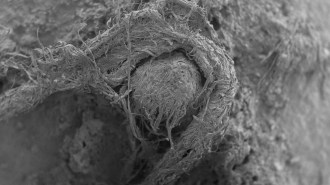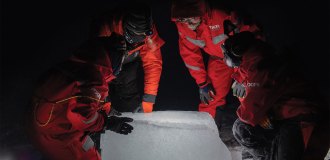All Stories
-
 Health & Medicine
Health & MedicineWarm weather probably won’t slow COVID-19 transmission much
While some evidence has suggested higher temperatures can affect coronavirus transmission, summer’s arrival probably won’t curb the pandemic much.
-
 Archaeology
ArchaeologyThis is the oldest known string. It was made by a Neandertal
A cord fragment found clinging to a Neandertal’s stone tool is evidence that our close evolutionary relatives were string makers, too, scientists say.
By Bruce Bower -
 Animals
AnimalsHitchhiking oxpeckers warn endangered rhinos when people are nearby
Red-billed oxpeckers do more than just eat parasites from rhinos’ backs. The birds can alert the hunted mammals to potential danger, a study finds.
-
 Space
SpaceNew search methods are ramping up the hunt for alien intelligence
Six decades of radio silence hasn’t stopped scientists searching for intelligent life beyond Earth. In fact, new technologies are boosting efforts.
-
 Space
Space‘Alien Oceans’ argues the search for E.T. should include the outer solar system
In Alien Oceans, a NASA scientist explores the evidence that ice-covered moons host hidden oceans, where life could evolve and thrive.
By Sid Perkins -
 Environment
EnvironmentA year long expedition spotlights night life in the Arctic winter
Scientists anchored to an ice floe near the North Pole are investigating how life survives polar night and what changes will occur as the Arctic continues to warm.
By Shannon Hall -
 Climate
ClimateThe largest Arctic ozone hole ever measured is hovering over the North Pole
A strong polar vortex in early 2020 led to what may be a record-breaking hole in the ozone layer over the Arctic.
-
 Life
LifeThe Great Barrier Reef is suffering its most widespread bleaching ever recorded
Major bleaching events are recurring with increasing frequency on the Great Barrier Reef, hindering its recovery.
-
 Space
SpaceRed giant stars that eat planets might shine less brightly
Some stars may shine less brightly after ingesting a planet. That finding, if confirmed, could have implications for calculating cosmic distances.
-
 Genetics
GeneticsThe PBS documentary ‘The Gene’ showcases genetics’ promise and pitfalls
A film from executive producer Ken Burns delivers an unfiltered history of genetics, showing how the science has helped and hurt people.
-
 Space
SpaceSaturn’s auroras may explain the planet’s weirdly hot upper atmosphere
Data from NASA’s Cassini spacecraft could help solve Saturn’s mysterious “energy crisis.”
-
 Life
LifeAlgae use flagella to trot, gallop and move with gaits all their own
Single-celled microalgae, with no brains, can coordinate their “limbs” into a trot or fancier gait.
By Susan Milius